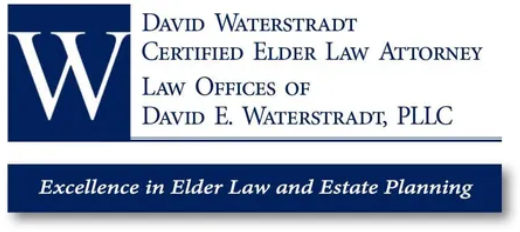Medicaid Planning Attorney in Muskegon, MI
Over 30 Years of Experience in Medicaid Law in West Michigan!
Planning for long-term care is a critical step in protecting your family's financial future—especially when nursing home or assisted living costs are involved. At the Law Office of David E. Waterstradt, we help individuals and families throughout Muskegon, Ludington, Whitehall, Grand Haven, and surrounding communities navigate the complex world of Medicaid eligibility and asset preservation.
Medicaid planning isn’t just about qualifying for coverage—it’s about protecting what you’ve worked hard to earn. Whether you're planning ahead or facing an immediate care need, we offer customized strategies that preserve your assets, reduce stress, and give you confidence in your future.
With over three decades of experience, Certified Elder Law Attorney (CELA) David Waterstradt provides trusted legal guidance backed by extensive knowledge of Michigan Medicaid regulations. Whether you're married or single, need help protecting a home or other non-exempt assets, or want to set up a long-term care trust, our team is here to help.
How Can You Protect Assets And Still Become Medicaid Eligible?
The number one question from people trying to qualify a loved one for Medicaid is: How can we keep or protect assets? Fortunately, with strategic and lawful planning, there are several proven ways to preserve more of your assets while still qualifying for Medicaid.
Understanding the nuances of Medicaid eligibility is crucial, as the program distinguishes between exempt and non-exempt assets. While exempt assets (such as a primary residence, one vehicle, and personal belongings) can often be retained, non-exempt assets usually must be “spent down” to qualify.
However, that doesn’t mean families are forced to deplete everything they’ve saved. With proper legal guidance, you can explore asset protection strategies such as converting countable resources into exempt ones, creating irrevocable trusts, or using tools like Medicaid-compliant annuities.
The right approach depends heavily on your family’s situation. For example, a married couple may be able to protect significantly more assets for the spouse who remains at home (known as the community spouse). If the applicant is single, strategies may involve gifting a portion of assets and using the remainder to fund a short-term annuity during the penalty period.
That’s why working with an experienced Medicaid planning attorney is so important. With professional help, families can avoid common mistakes, expedite eligibility, and ensure their loved one receives the care they need—without sacrificing everything they’ve worked for.
Medicaid Planning FAQs
What Assets Can You Keep Regardless of Marital Status?
The Medicaid laws that apply to a single person are different from those that apply to a married person. However, some laws apply to both single and married individuals.
Regardless of whether you are single or married, generally speaking, you can become Medicaid eligible and keep the following assets: your home, one vehicle, personal belongings, a prepaid irrevocable funeral contract, life insurance with a combined face value of $1,500 or less, and up to $9,660 of cash or other countable assets. These are known as “exempt assets.” Your other assets (“non-exempt assets”) have to be “spent down” before you can become Medicaid eligible.
To determine how best to maximize your assets, the first thing to look at is whether you own exempt assets, and if not, whether it makes sense to convert non-exempt assets into exempt assets. For example, do you have a prepaid irrevocable funeral contract? If not, we generally recommend that you use non-exempt cash to purchase one.
Another example is the condition of your home. Does it need a new roof? Does it need a new furnace? If so, we generally recommend that you use some of your non-exempt assets to purchase those items for the home so that the value of the home is increased.
What Additional Assets Can You Keep If You Are Married?
If you are married, Michigan law provides that a spouse who continues to live at home, known as the “community spouse,” may keep additional assets that equal one-half of your non-exempt assets (sometimes referred to as your “countable assets”), up to a maximum of $157,920 (this is the amount for 2025; however, this amount changes annually). The great news is that we can help you keep the balance of your assets that exceed the amount Michigan law allows the community spouse to keep. We do this by using either a Medicaid-compliant annuity or a sole benefit trust.
In the case of an annuity, excess assets are transferred to the community spouse who uses them to purchase an irrevocable immediate annuity from a life insurance company. The insurance company pays the assets back to the community spouse in equal monthly payments over a period equal to or less than the life expectancy of the community spouse.
In the case of a sole benefit trust, a trust is created for the sole benefit of the community spouse. Payments must be made out of the trust to the community spouse on at least an annual basis on an actuarially sound basis, i.e., at a rate that will distribute all the assets during the community spouse's life expectancy. DHHS has tried to prohibit the use of sole benefit trusts, but litigation has confirmed that they remain a viable planning alternative. The trust legally obligates itself to pay the assets back to the community spouse in equal monthly payments over a defined term. The promissory note has to be irrevocable and cannot be forgiven or cancelled. If the excess assets consist of cash, a commercial annuity is preferable because it eliminates the possibility of family members failing to make required payments due to death, bankruptcy, divorce, or other reasons. However, holding excess assets in cash can be difficult. To convert other assets, such as real estate (other than the home), into cash, a promissory note might be preferable.
What Additional Assets Can You Keep If You Are Single?
If you are a single person who needs to become Medicaid eligible, you face a dilemma: You can keep your home, but only have $9,660 to maintain it. Where does the money come from to pay property taxes, homeowners’ insurance, utilities, etc.?
Fortunately, there is a way that you can give approximately 50% of your non-exempt assets and still become Medicaid eligible. This is accomplished with a “short-term” Medicaid-compliant annuity.
In simple terms, you can give away approximately one-half of your non-exempt assets and use the other half to purchase a Medicaid-compliant annuity. The gift will trigger a Medicaid ineligibility period. The term of the annuity has to be carefully calibrated to match this period of ineligibility to give the Medicaid applicant sufficient income (when combined with Social Security, pensions, and any other regular income) to pay the cost of nursing home care. Once the annuity is fully paid out, the applicant becomes Medicaid eligible. The approximately 50% that is gifted can then be used to cover the costs of maintaining the home, to pay expenses not covered by Medicaid, or eventually be kept by the heirs.
Can I Protect My Assets Before I Need Long-Term Care?
If your need for nursing home care is not imminent, it’s possible to set up a trust that may allow you to protect even more assets. For example, an irrevocable trust can be set up with your children as beneficiaries.
It may be possible for you to remain the “income beneficiary” of the trust. Once assets are transferred to the trust, if five years pass without the need to apply for Medicaid to cover long-term care costs, the assets in the trust will no longer be considered by Medicaid.
For married couples, it is possible to establish a testamentary trust for the benefit of your spouse in the estate plan that will protect assets for the surviving spouse without triggering the five-year look-back period.
Is It Too Late To Plan If A Loved One Is Already In A Nursing Home?
Not at all. While earlier planning allows for more flexibility, there are still legal tools available for preserving some assets even after a loved one has been admitted. Immediate crisis planning can still make a significant difference in asset retention.
Do I Need An Attorney To Apply For Medicaid?
While it’s possible to apply on your own, Medicaid rules are complex and often change. Working with an experienced Medicaid planning attorney ensures you're maximizing asset protection strategies and avoiding errors that could lead to costly delays or denials.
Why Choose The Law Office Of David Waterstradt?
At The Law Office of David E. Waterstradt, serving the Muskegon, MI area, our expert guidance meets compassionate advocacy in Medicaid planning and elder law. As a distinguished Medicaid planning attorney, David E. Waterstradt leverages over 30 years of experience to help individuals and families navigate the intricate landscape of Medicaid eligibility and asset protection.
At The Law Office of David E. Waterstradt, serving Muskegon, MI area, our expert guidance meets compassionate advocacy in the realm of Medicaid planning and elder law. As a distinguished Medicaid planning attorney, David E. Waterstradt leverages over 30 years of experience to help individuals and families navigate the intricate landscape of Medicaid eligibility and asset protection.

